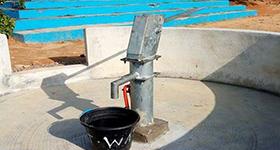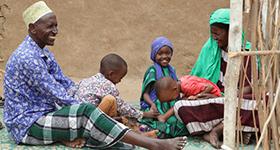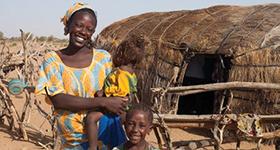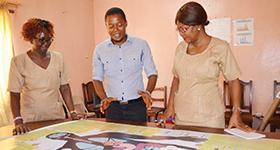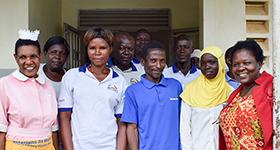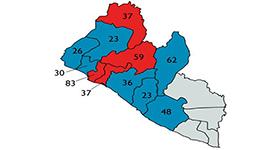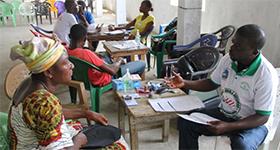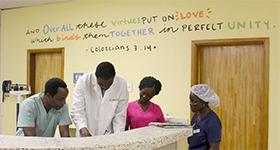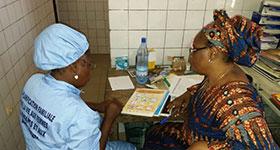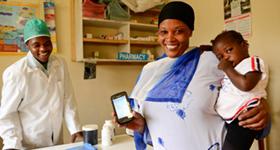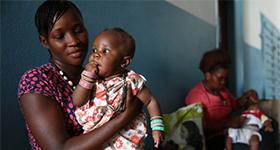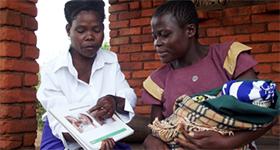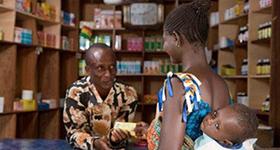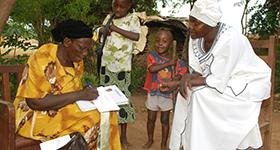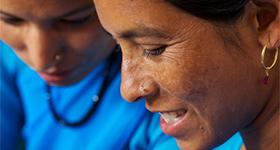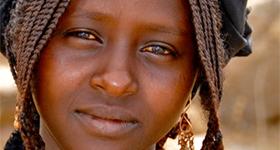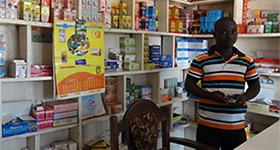With only two psychiatrists and 19 mental health nurses (MHN), Sierra Leone has an extremely limited ability to diagnose and treat mental health (MH) conditions. Further, an overall poor understanding of MH conditions and limited MH training and education in the health workforce have contributed to high levels of stigma toward MH patients and services.
Technical Briefs
View a list below of all APC technical briefs.
|
October 2019 |
October 2019 The APC Ebola Transmission Prevention & Survivor Services program supports the Liberian Ministry of Health with comprehensive and integrated Ebola virus disease (EVD) survivor services. The three main objectives of the project are to: 1) strengthen national coordination mechanisms for survivor care; 2) improve access for survivors to sub-specialty health services for common post-EVD sequelae; and 3) strengthen health systems and reduce stigmatization of survivors. |
July 2019 This brief summarizes the work of selected APC grantees that integrated gender into existing activities. We discuss approaches employed in the programs’ design and implementation that rise to the level of “promising practices.” |
|
May 2019 Since the 1990s, Senegal has made notable progress in key health indicators. Between 1990 and 2017, maternal mortality dropped from 540 to 236 deaths per 100,000 live births, and the percentage of fully vaccinated children steadily increased from 58.7 percent to 75 percent in approximately the same period. In just the past decade, child mortality more than halved from 121 to 56 deaths per live births, with a reduction in disparity between urban and rural households. |
December 2018 The Comprehensive Program for Ebola Survivors (CPES) program included interventions at the community, primary, secondary, and tertiary levels to meet EVD survivors' health and social needs, in addition to their objective of maintaining zero new cases of Ebola virus disease (EVD). |
December 2018 This resource is intended for use by program managers, Ministry of Health staff, and other stakeholders (such as faith-based groups, implementing partners, family planning champions, and policy makers) who are interested in expanding community-based family planning (CBFP) care through community health workers in Uganda and other countries. |
|
July 2018 This technical brief describes the USAID-funded Ebola Transmission Prevention & Survivor Services (ETP&SS) program’s efforts to increase access to medical and mental health services for Ebola virus disease (EVD) survivors in Liberia. Increasing access to care, one of the ETP&SS program’s three core objectives, was achieved through a mix of capacity building and health care service delivery activities. |
July 2018 This technical brief provides an overview of the results from the USAID-funded Ebola Transmission Prevention & Survivor Services (ETP&SS) program’s baseline and endline assessments. The surveys were conducted with the survivor community to identify program targets, understand the broader context in which the program was operating, and assess program successes and changes over time in the survivor experience. |
July 2018 This technical brief describes the Advancing Partners & Communities (APC) Project’s engagement with two faith-based health facilities in Liberia, Eternal Love Winning Africa (ELWA) and Saint Joseph’s Catholic Hospital (SJCH). These faith-based organizations received direct support from APC to provide comprehensive health care services to the Ebola survivor community. |
|
January 2018 The goal of the assessment was to provide information to help the Benin MOH decide whether community-based provision of injectables should be brought to scale and if so, to provide guidance for scale up. |
December 2017 The Sustainable Development Goals will be difficult to achieve without vigorous participation from the private sector. In fact, private drug shops and pharmacies are a widely-used source for health information, products, and services, including family planning (FP), especially in sub-Saharan Africa. |
May 2017 Through this brief, the APC project documents its experience integrating FP into existing health and non-health projects implemented by seven grantees working in challenging environments in sub-Saharan Africa and South Asia, and provides insight about the added value of integration. |
|
May 2017 Over the past three decades, Malawi has made great strides in improving key health indicators. Maternal mortality declined by one-third, from 957 to 634 deaths per 100,000 live births between 1990 and 2015. The percentage of births delivered by a skilled attendant increased from 54.2 percent in 2000 to 89.8 percent in 2015. |
September 2016 At the London Family Planning Summit in 2012, the Government of Uganda committed to providing universal access to family planning and reducing unmet need for family planning from the current 40 percent to 10 percent by 2022. |
March 2016 This situation analysis aims to review the evidence on current models of community-to-facility referrals for long-acting and reversible contraception and permanent methods (LARC/PM), to provide recommendations on promising models that should be tested for effectiveness, and to provide an agenda for future research. |
|
January 2016 Nepal has made impressive progress in reducing infant, child, and maternal mortality since it began providing community-based service delivery 20 years ago. Since 1990, the maternal mortality ratio (MMR) has declined by more than two-thirds, from 850 deaths per 100,000 live births in 1990 to 190 in 2011. |
November 2015 Churches and faith-based organizations (FBOs) are grounded in service to others and follow the teachings of Jesus by showing love for all those around us. We understand that it is vital both to share expressions of love and faith and also to ensure that our actions are consistent with our words. |
July 2014 This brief provides guidance about writing policy to enable the provision of injectable contraceptives by non-clinical community health workers (CHWs). The guidance is informed by the experience of African countries with policies that promote community-based access to injectable contraceptives (CBA2I), such as Ethiopia, Madagascar, Malawi, Senegal, and Uganda. |
|
July 2014 This brief focuses on the use of drug shops to increase access to injectable contraceptives. This strategy has not received sufficient attention in the literature. USAID has developed a high impact practice brief on family planning provision through both drug shops and pharmacies. |


